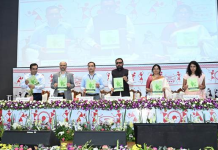Amid uncertainty and confusion over government regulations that set specific targets for the use of recycled plastic in various forms of packaging—including multilayered as well as rigid plastics and PET bottles—from 1 April 2025, as part of the EPR norms, the Food Safety and Standards Authority of India (FSSAI) has allowed the use of rPET in packaging, storing, carrying, or dispensing food products.
The 28 March 2025 amendment, which modifies the Food Safety and Standards (Packaging) Regulations, 2018, however, says recycled PET can be used only when the standards and guidelines are notified by the food regulator. “All rPET packaging must comply with relevant national standards or regulations,” the FSSAI notification says.
“In the Food Safety and Standards (Packaging) Regulations, 2018, in regulation 4, in sub-regulation (4), for clause (e), the following clause shall be substituted, namely – (e) Products made of recycled polyethylene terephthalate (PET) may be used for packaging, storing, carrying or dispensing of food products as and when standards and guidelines are notified by the food authority and such packaging materials shall comply with national standards or regulations as applicable to such materials,” the FSSAI notification signed by G Kamala Vardhana Rao, chief executive officer, says.
In a recent stakeholder consultation on sustainable packaging for food in Mumbai, the Union Minister of State for Health and Family Welfare Prataprao Ganpatrao Jadhav announced that the guidelines – which were yet to be released – for the use of rPET in packaging have been prepared by FSSAI after extensive consultations and in line with the best global practices.
The FSSAI move assumes significance in the wake of the mandatory use of 30% recycled plastic for category 1 packaging, defined as rigid plastic, which includes PET bottles, primarily used by beverage manufacturers, from 1 April 2025. Category II, which provides for flexible mono-layered plastics, has to use 10% recycled plastic, while category III, multi-layered plastics, has a 5% target for FY 2025-26.
All categories have a specific annual increase in targets. Category I has a 60% target by FY 2028-29, and category II has 20%. Category III has a 10% target to meet by FY 2028-29. The norms apply to all PIBOs (producers, importers, and brand owners) who manufacture, import or use plastic packaging materials.
Beverage and FMCG players, however, feel that the targets are impractical because of recycling infrastructure limitations, material shortage, and potential cost increases. The industry has requested the government to give the industry more time to meet targets or allow some relaxation in the norms.
According to reports in the financial press, leading beverage manufacturers were even considering legal options as compliance would be difficult when summer demand soars. They say the move to higher rPET content without adequate infrastructure could disrupt supply chains. Others say the cost increase could be passed on to consumers.
The Hindu Businessline quoted industry leaders as saying that despite ongoing investments, recycling capacity expansion will take 2-3 years. At present, only five FSSAI-approved plants are equipped to produce food-grade rPET, meeting just 15% of industry demand, the report said.
Media reports, however, indicate that the government was unlikely to budge. Replying to a question in the Lok Sabha as to whether the government was planning to implement its 1 April deadline, Kirti Vardhan Singh, minister of state in the Ministry of Environment, Forest and Climate Change – the nodal agency implementing the changes – said the targets were made applicable from 2025-26, three years after the EPR guidelines were notified, in order to provide adequate time to the industry to prepare for the shift.
According to Singh, the guidelines were notified after due consultations with stakeholders, adding that there is a mechanism to deal with grievances. Exemptions in such cases, he said, will be granted by the Central Pollution Control Board on a case-to-case basis. If the industry or stakeholders flag any concerns, the Ministry will consider them and take necessary action as deemed appropriate.
One concern is that when industry stakeholders speak of infrastructure they ignore the waste collectors. When it can no longer be ignored, this will be addressed. When waste collectors are suitably acknowledged and paid, several defects or concerns in the eco-system will be fixed.










